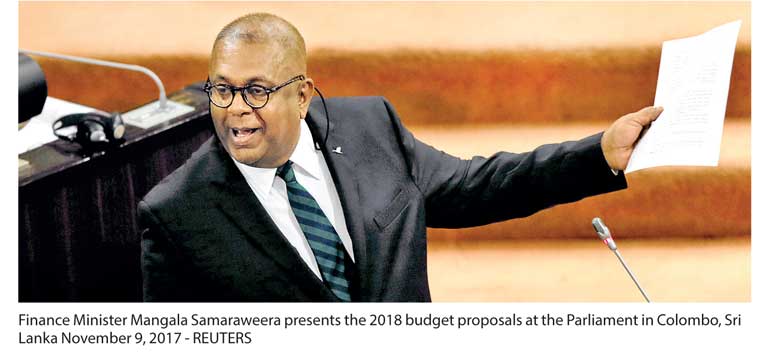 By Enterprise Ceylon Capital
By Enterprise Ceylon Capital
The 2018 budget proposals (i.e. Second Reading of the Appropriation Bill) were presented to the parliament on 9 November 2017 by Minister of Finance and Mass Media Mangala Samaraweera.
The proposals were presented under the theme “BLUE-GREEN – ENTERPRISE SRI LANKA”.
Accordingly, the budget framework seeks to
1) integrate the full economic potential of ocean related activities in formulating the overall growth strategy
2) build the economy using environmentally sustainable development strategies and
3) Encourage entrepreneurship.
The proposals provide various financing incentives to enterprises seeking to develop export markets, SMEs, micro level entrepreneurs and startups. In addition, in keeping up with the Government’s policy on liberalizing trade and improving the competitiveness of local industries, para tariffs would be removed from a further 1,200 goods.
As expected by us, the Government has increased the estimated budget deficit/GDP for 2017 to 5.2% from the initial target of 4.6% with the delay in the implementation of the new Inland Revenue Act. The budget deficit to GDP for 2018 is projected to be 4.8%.
Value Added Tax, Nation Building Tax, ESC and Amendments to Finance Act will be implemented with effect from April 1, 2018; while Customs Duty, Excise (Special Provisions) Duty and Excise (Ordinance) Duty will take effect immediately.
Key medium term economic targets
- Budget deficit to GDP of 3.5% by 2020
- Economic growth of ~6% in 2020
- Per capita GDP of USD5,000 in the medium term
- 1,000,000 jobs in the medium term
- FDI flows of USD5bn in the medium term
- Exports of USD20bn in the medium term
Impact on key sectors listed
General/Colombo Stock Exchange
- Necessary legal framework and the policy environment to be created for the development of capital markets (positive)
- Government to divest its holdings in non-strategic enterprises to improve market activity (positive)
- Bank of Ceylon and Peoples’ Bank to be allowed to raise capital via the equity market (Government would continue to maintain its controlling stake), provided depositors and employers also have the option to become shareholder (positive)
- Revival of Underperforming Enterprises or Underutilized Assets Act, No. 43 of 2011 to be repealed (positive)
- Beverage, Food & Tobacco sector
- Excise duty based on volume of alcohol to be introduce (positive for LION as currently the excise duty per unit of alcohol remains higher for beer than hard liquor)
- Excise Duty to be imposed on raw materials used for manufacturing of ethanol (negative for liquor producers as locally sourced ethanol prices could go up)
- Excise (Special Provisions) Duty that is currently applicable on canned beer will be removed (positive for LION)
- The current NBT exemption on the sale of liquor would be removed (negative)
- An Excise (Special) Levy of 50 cents per gram of sugar to be applicable for sweetened beverages (could be negative for beverage producers such as CCS)
- Imports of maize to be liberalized provided such imports are made to meet local maize production shortfall (positive for poultry producers)
- Under-utilized state farms to be provided on lease to develop
- modern poultry farms (positive for poultry producers)
- License to be issued to import Cigarettes and Cigars (negative for CTC)
- Telecommunication
- A Cellular Tower Levy of LKR200,000 per month per tower to be introduced (negative)
- SMS Advertising Levy of 25 cents per SMS for bulk SMS advertisements will be imposed on advertisers (negative for Telco operators as there could be a drop in bulk SMS advertisements)
- Bank, Finance & Insurance
- A Debt Repayment Levy to be paid by financial institutions on cash transactions (LKR2 per Rs. 10,000 worth cash transaction) for 3 years (negative)
- A concessionary loan scheme to be introduced by the National Savings Bank to facilitate first time middle income home buyers (negative for listed BFIs)
- The loan to value ratio for electric busses and three wheelers to be revised to 90/10 (positive)
- Establishment of a Development Bank to finance SME/micro level enterprises (negative)
- Property
- The current VAT exemption on the sale of condominium housing units would be removed (negative)
- Restrictions that limit the land ownership rights of listed companies with foreign ownership together with the restrictions on foreigners’ ability to purchase condominiums below the 4th floor to be removed (positive)
 By Enterprise Ceylon Capital
By Enterprise Ceylon Capital